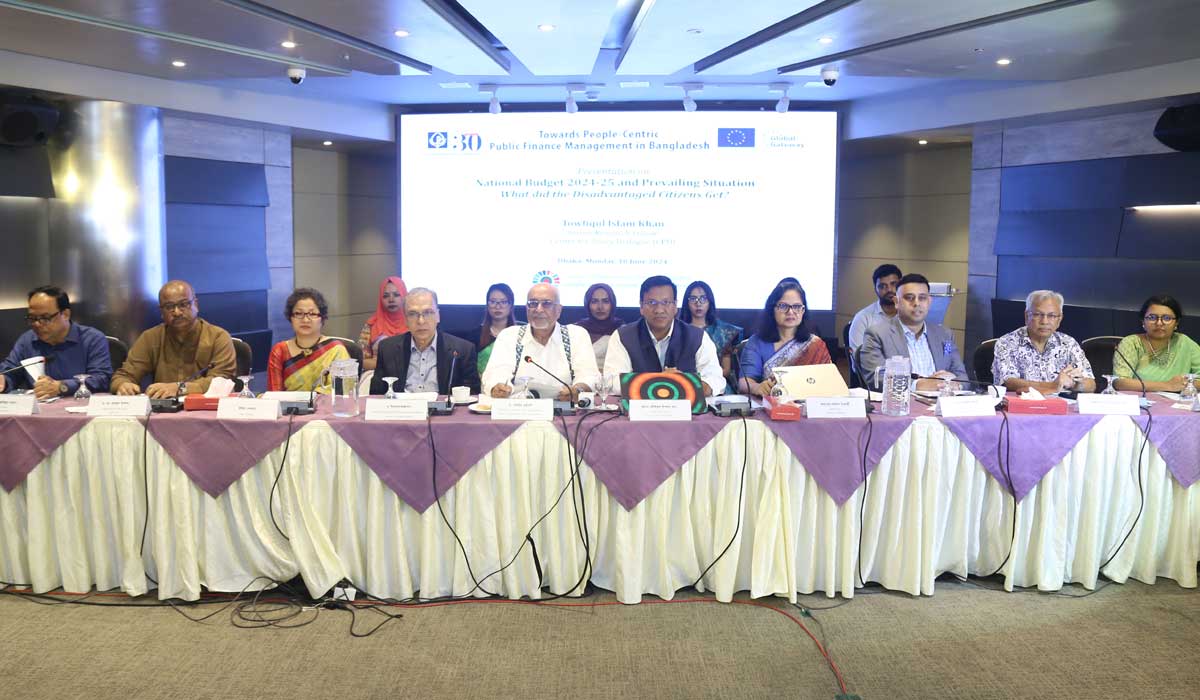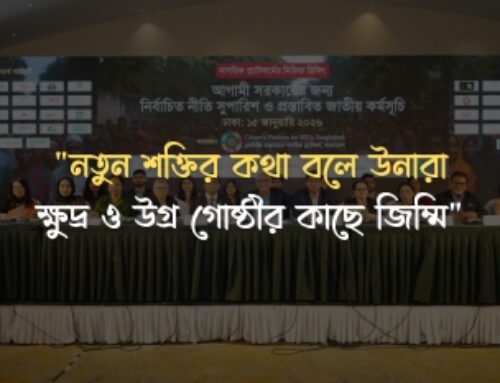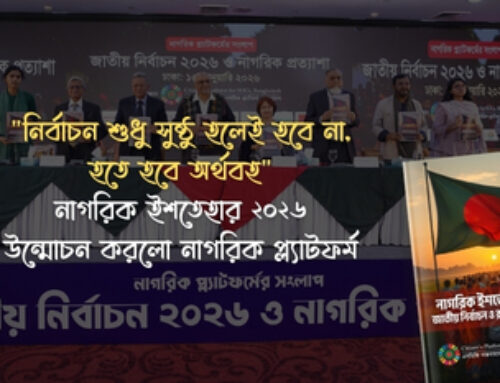
Click Here to Download Keynote Presentation
Amidst the ongoing socio-economic situation, the national budget 2024-25 was supposed to ensure stability, protection and reform for the left-behind population of the nation. The budget should have prioritised public services for the marginalised groups and supported them to cope with high commodity prices, along with addressing the rising inequality with fiscal policy tools, restoring macroeconomic stability while protecting economic growth and employment prospects. Regrettably, the budget did not do justice to the election manifesto of the ruling party or the 8th Five-Year Plan.
These observations were discussed at a post-budget media briefing titled ‘National Budget 2024-25 and Prevailing Situation: What Did the Disadvantaged Citizens Get?’ on Monday, June 10, 2024, organised by the Centre for Policy Dialogue (CPD) and Citizen’s Platform for SDGs, Bangladesh, with support from the European Union. The media briefing was chaired by Dr Debapriya Bhattacharya, Distinguished Fellow, CPD and Convenor, Citizen’s Platform for SDGs, Bangladesh. The keynote presentation was delivered by Mr Towfiqul Islam Khan, Senior Research Fellow, CPD. Besides, experts from different sectors were present at the briefing as offer their critical comments on specific issues.
In the keynote presentation, Mr Khan emphasised that ensuring the efficacy of national budgets is dependent on implementation competence, which is critical for FY2025 given the economic crisis. Disadvantaged groups suffer the most, which is deteriorated by shortages of data and a lack of result-based monitoring. Crisis management requires policy changes that promote transparency and democratic accountability in order to achieve a sustainable recovery. He suggested that civil society must closely monitor budget implementation through localised instruments such as social audits and citizen consultations, and engagement with public officials and stakeholders is critical in this crisis.
The keynote presentation was followed by discussions and comments by the issue experts. Dr Mostafizur Rahman, Deputy Director of Campaign for Popular Education (CAMPE), drew attention to the reduced budget allocations for primary education, mentioning that infrastructure improvement has been prioritized over research, capacity enhancement of the teachers and educational resources. He underscored that the reduced budgetary allocation for Technical and Vocational Education and Training (TVET) programmes will eventually have a negative impact on those students who are already suffering from learning loss due to the impact of the pandemic and poor results in higher secondary and secondary school examinations.
The Regional Director (South Asia) of WaterAid, Dr Md. Khairul Islam raised concerns that the budget appeared to be a declaration of satisfaction rather than providing guidance to address the ongoing crisis. He shared an example to this end, mentioning that the location of the water treatment facilities is determined by those in power rather than by the regions that have been affected, which is endangering the vulnerable communities. He further expressed his concerns about out-of-pocket expenditures to get health services which is increasing day by day, especially for the marginalised communities. He criticised that the proposed budget disregarded to address these issues for the people with lower incomes.
Professor Sharmind Neelormi, Department of Economics, Jahangirnagar University, attributed the budget as unprofessional and underscored that the climate budget included remarks without appropriate references, which makes us doubt its credibility. She drew attention to the discrepancies in the budget’s allocation for climate adaptation. Again, questions also remain about the allocation of the budget for proper divisions or ministries that will be actually responsible for implementing climate adaptation programmes. While hopeful about gender budgeting, she stressed the need for expanding social protection and services for people with disabilities.
Professor Dr A K M Enamul Haque, Dean, Faculty of Business and Economics, East West University, emphasized that it is now high time the government should decide on a definition to justify the subsidies given in the energy sector. He added that it should be redefined to distinguish between logical subsidies and additional payments for oversights. He added that the budget lacks strategic investment, while the budget should have been a strategic plan to relocate investments and alter the economy’s momentum. He advocated for the correspondence of policies and quality research to address economic challenges effectively.
Writer and Columnist Ilira Dewan highlighted issues of food insecurity, educational disparities, and language barriers faced by ethnic minorities. She emphasised the importance of direct elections for Zila Parishads in Chittagong Hill Tracts and urged for improved allocation and monitoring to address persistent inequalities.
Discussing the private sector, Dr M Masrur Reaz, Chairman and CEO of Policy Exchange Bangladesh, criticised the budget’s failure to address long-term economic needs, particularly inflation, foreign exchange regime stabilisation, hundi and trade-based money laundering. He stated that political governance, banking governance and technical solutions are absent in the budget which are critical to stabilise the economy.
Core Group Member of Citizen’s Platform and Executive Director of Transparency International Bangladesh (TIB), Dr Iftekharuzzaman, described the budget as ambitious yet discriminatory; which encourages corruption, contradictory with the constitution and insignificant for the disadvantaged citizens. He added that the budget is lacking a strategic plan for LDC graduation. Mentioning the constitution of Bangladesh and the election manifesto of the ruling party, he claimed that the budget stands contrary to these and against morals while gratifying the business-politics-bureaucracy nexus. It rather depicts a discouraging portrayal for the youth of the country. He called for leadership with strong political will which is essential for establishment of a Parliamentary Committee for budget oversight.
Following the discussion, journalists asked questions to the issue experts. Several quarries were raised about allocation priorities, the banking sector, inflation, employment, investment, debt, and law reformation. Lastly, the journalists asked what steps or initiatives could be taken to reduce corruption.
In closing remarks, Dr Debapriya Bhattacharya underscored that the budget lacks direction towards stability, protection of the disadvantaged and reformation. He insisted that the budget is not loyal towards the election manifesto and 8th Year Plan of the ruling party, and incompatible with the commitments of the budget itself. He emphasised the need for reforms in the budget as it lacks strategy and policy leadership. The problem is power and politics as politics is against the people. He insisted on transparent fund utilisation and urged for greater public and media engagement to ensure accountability in policymaking.





Leave A Comment